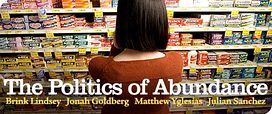Brink Lindsey raises a valid issue — the public’s demand for more health care benefits seems to be colliding with its distaste for a large increase in tax revenues. The circle could be squared by having Medicaid and Medicare implement cost-saving measures, but that seems unlikely as well. And it’s true, none of the possible approaches to health care — price controls, entitlement cuts, or substantially higher taxes — seem especially likely. I’m far from certain as to which path the country will take.
The least-likely path of all, however, is the libertarian one in which the government steps back from a commitment to ensure the health of its citizens. As I speak, the president is threatening to veto a popular bill to expand the SCHIP health insurance program for children, a measure that will certainly become law if the Democrats win in 2008 and that it seems unlikely a Republican president would be willing to veto if he weren’t a lame duck. The political struggles in this area will, no doubt, become extremely intense in the future, but I’m reasonably confident that the predominant approach will be some combination of higher taxes and price controls. Lindsey mentions Tyler Cowen’s observation that it is precisely the prosperity generated by a well-functioning capitalist system that makes higher tax levels affordable which is, I suppose, “ironic” to a libertarian expecting to find Marxists beneath the bedsheets everywhere, but fairly unsurprising from a liberal perspective. Indeed, I’m not really sure why someone with Lindsey’s outlook would find this prospect threatening — entitlement spending has, after all, grown steadily over the past thirty years and Lindsey is enthusiastic about that period, why should the future be any different?

